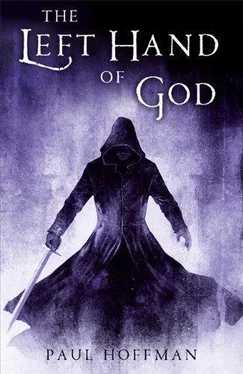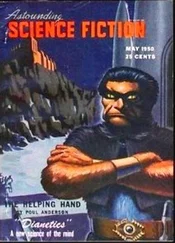“What is it?” she said.
“Um. Meat,” said Vague Henri vaguely.
He moved toward her and shoved it under her nose. It smelled very much as a dead rat might be expected to. Her delicate nose wrinkled in involuntary disgust.
“Ugh, no.” Though she quickly added, “Thank you.”
“Going without for a bit won’t do her any harm,” muttered Kleist under his breath, but loudly enough for the girl to hear. Riba, however, was not aware that she was in any way less than perfect. She had been told so all her life, and as a result Kleist’s remark, although she was aware it was hostile, conveyed no specific insult to her at all.
“I’ll take first watch,” said Cale, and with that he turned and walked to the top of a nearby scab. The two remaining boys lay down and within minutes were asleep. Riba, however, could not settle and she began to sob quietly. Kleist and Vague Henri were dead to the world. Cale, however, on the top of the scab, could hear the sound of her crying and considered it carefully before finally she too fell asleep.
The next morning the boys woke at five as usual, but there was no point in striking camp, such as it was. “Let her sleep,” said Cale. “The more rested she is the better.”
“Without her we could be eighty, perhaps a hundred, miles from here,” muttered Kleist. A knife thudded point-down at his feet.
“I took it from Picarbo. Cut her throat, if you like. Anything, so long as you stop whining.” His tone was matter-of-fact, not angry at all. Kleist stared at Cale, eyes cold and full of dislike. Then he turned away. Vague Henri wondered if he had really been ready to kill the girl or perhaps use the knife on Cale-or whether he just liked having something to complain about. Cale, at any rate, was wise enough not to imply any kind of victory when he spoke again.
“I’ve an idea. Perhaps we can make use of the problem with the girl.”
Kleist turned back, sullen-but he was listening. “If we can’t put distance between us and the search parties to east and west of us, it’s best if we track them to make sure we don’t cross them by accident.”
He bent down and picked up the knife and started drawing in the sand. “If Henri and the girl move south in a straight line and don’t do more than twelve miles a day, then Kleist and me will always know where you are, pretty much. Kleist goes west, I’ll go east, and find the two nearest search parties.” He gestured to the straight line he’d drawn for Henri and Riba. “If we think they’re going to hit the search parties as they zigzag, then we return and take them off in the other direction.”
Kleist looked thoughtful as well as dubious.
“Suppose you come back and take them off somewhere. How am I supposed to find you when you’re not at the meeting point?”
Cale shrugged. “You’ll have to decide whether to track us or make your own way to Memphis. Wait for us there as long as you think best.”
Kleist sniffed and looked away. It was an agreement of sorts.
“Does that suit you?” asked Cale, nodding to Henri.
“Yes,” said Vague Henri. “There are a lot of things I want to find out from the girl.”
Within five minutes, having split the food and water, Kleist and Cale were moving off to east and west. In five minutes more they’d vanished from sight.
Vague Henri was sitting down eating his breakfast and looking at the girl as she slept, observing the beautiful pale skin, the red lips and the long eyelashes, the sense of beautiful peace. He was still watching, fascinated, an hour later when she woke up. She was startled at first to find Vague Henri looking straight at her, not more than three feet away.
“Didn’t anyone ever tell you it’s rude to stare?”
“No,” said Vague Henri truthfully.
“Well, it is.”
Henri looked down at his feet and now felt awkward.
“I’m sorry,” she said. “I didn’t mean to be so harsh.”
At this, Vague Henri forgot his awkwardness and burst into laughter.
“What’s so funny?” she said, angry again.
“For us, being harsh means dragging you out in front of five hundred people and the Redeemers stringing you up.”
“What do you mean?”
“Hanging you by the neck. You know, like the Hanged Redeemer.”
“Who’s the Hanged Redeemer?”
This shut him up. He looked at her as if she had asked what the sun was, or if animals could talk. He said nothing for some time, but there were hammers beating in his brain about what this could possibly mean.
“The Hanged Redeemer is the son of the Lord of Creation. He sacrificed himself to wash our vile sins away with his blood.”
“Uuugh!” she said. “Whatever for?”
His look of astonishment made her instantly regret her reaction. “I’m sorry, I didn’t mean to offend you. It’s just such a strange idea.”
“What is?” he said, still openmouthed.
“Well… what sins? What did you do?”
“I was born sinful. Everyone is born full of revolting sin.”
“What a ridiculous idea.”
“Is it?”
“How can a baby have done anything wrong, let alone anything dreadful?”
Neither of them said anything for a moment. “And why would you wash something away in blood?”
“It’s a symbol,” he said, defensive and wondering why.
“I’m not stupid,” she replied. “I can see that. But why? Why would you use blood as a symbol of something like that?”
Vague Henri was, by nature, someone who thought carefully about everything. But these ideas had been so much a part of him and for so long that she might just as well have questioned the point of his arms or the meaning of his eyes. “Where are the others?” she said. Still reeling over what he had heard, his answer was distracted.
“Oh, they’ve gone.”
“They’ve left us?” she said, eyes widening in alarm.
“Only for a few days. They’re going to track down the searchers on either side of us and make sure we don’t walk into them.”
“How will they find us again?”
“They’re very good at tracking,” Henri said evasively.
“I don’t understand,” she said. “I thought you said you hardly ever left the Sanctuary?”
“Um… we better get going. I’ll explain as we go along.”
Redeemer Bosco raised his walking stick and rapped twice on the door.
It was nearly thirty seconds before it opened, but he did not show any sign of impatience, or indeed any sign at all. Finally the door opened and a tall man, another Redeemer, stood in front of the Lord Militant.
“Do you have an appointment?” said the tall man.
“Don’t be foolish,” replied Bosco, terse and dismissive. “The High Redeemer asked to see me. Here I am.”
“The High Redeemer commands, he does not ask any-”
Bosco pushed past him. “Tell him I’m here.”
“He’s displeased with you. I’ve never seen him so angry.” Bosco ignored him as the tall man went over to an inner door, knocked and went in. There was a short pause, the door opened again, and the tall man returned, smiling, though nothing pleasant was intended.
“He is ready to see you now.”
Bosco walked into a room so dark that even the gloom-accustomed eyes of the Lord Militant found it hard to see. It was something more, though, than the small shuttered windows and the dark tapestries murkily retelling stories of ancient and hideous martyrdoms. The center of the darkness seemed to come from the bed in the corner. A man was sitting up, propped by at least a dozen uncomfortable cushions. Bosco had to move very close before he could make out the face, the skin pale to the point of being white, and hanging down from cheek and neck in endless scrawny folds. The eyes were watery, as if the mind had long gone. But when he caught sight of Bosco something bright flashed there, a light full of hate and great cunning.
Читать дальше











